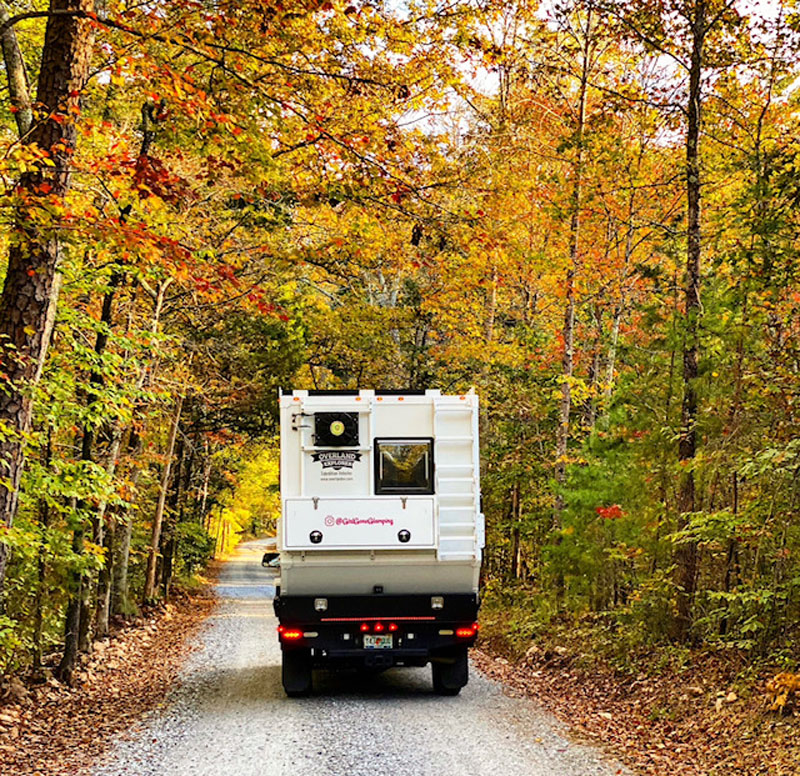Traveling solo in an OEV camper has afforded Lindsey Kszos a level of absolute personal freedom few of us can imagine. It has also brought challenges with safety, breakdowns, and decision fatigue few of us would want to handle alone. Here is Lindsey’s truth about solo truck camping; the good, the bad, and the reality check.
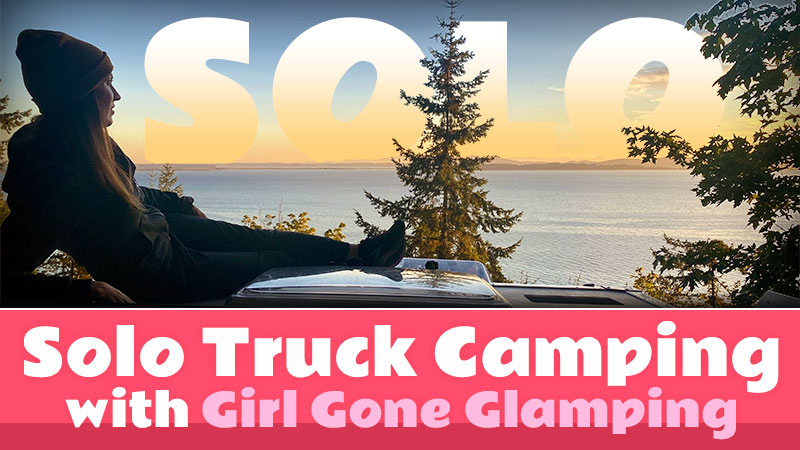
For those of us who travel as a couple or families, it can be hard to imagine traveling alone. Not only do we (hopefully) enjoy the companionship, but there’s a lot to plan, navigate and handle while traversing the unknown. Decisions like what to do next, what routes to take, where to stay at night, and how to handle a situation with a truck, camper, or health issue are handled as a team.
All of that stated, traveling alone isn’t always a choice. Some of us lose our partners in life. Some of us have partners who don’t share our wanderlust. Some of us have hobbies or even careers that necessitate traveling alone. Perhaps you live in Michigan and there’s a wedding in Texas and – last minute – your spouse gets called to attend a mandatory business meeting in Seattle that same week. Off you go to Texas in your camper; by yourself. The point is solo truck camping happens for all kinds of reasons.
So what is it really like to go truck camping solo? What are the realities around trip planning and overnight stops? Do the opportunities for personal freedom outweigh or counterbalance the potential for loneliness? Are the risks higher or lower than imagined? What’s the truth about setting out alone in a truck camper?
All of this went through my mind when I first learned about Lindsey Kszos of Girl Gone Glamping. Her articles and social media show a person having the time of her life, but I wondered about the rest of her story. As a female, I also was curious about how she approached her personal safety. There have been very few times over the past eighteen years of truck camping when I didn’t feel safe, but I was really glad I wasn’t alone when those moments happened. How does Lindsey handle this part of her lifestyle?
When I contacted Lindsey, I talked to her about these topics and asked if we could shape her interview accordingly. She welcomed the focus on safety and openly shared what she’s learned from six years of full-time traveling alone. Not everything that follows is fun and adventure, but Lindsey’s story, perspectives, and advice should be considered mandatory reading for anyone considering solo travel.
Thank you for sharing your truth, Lindsey. And keep on glamping!
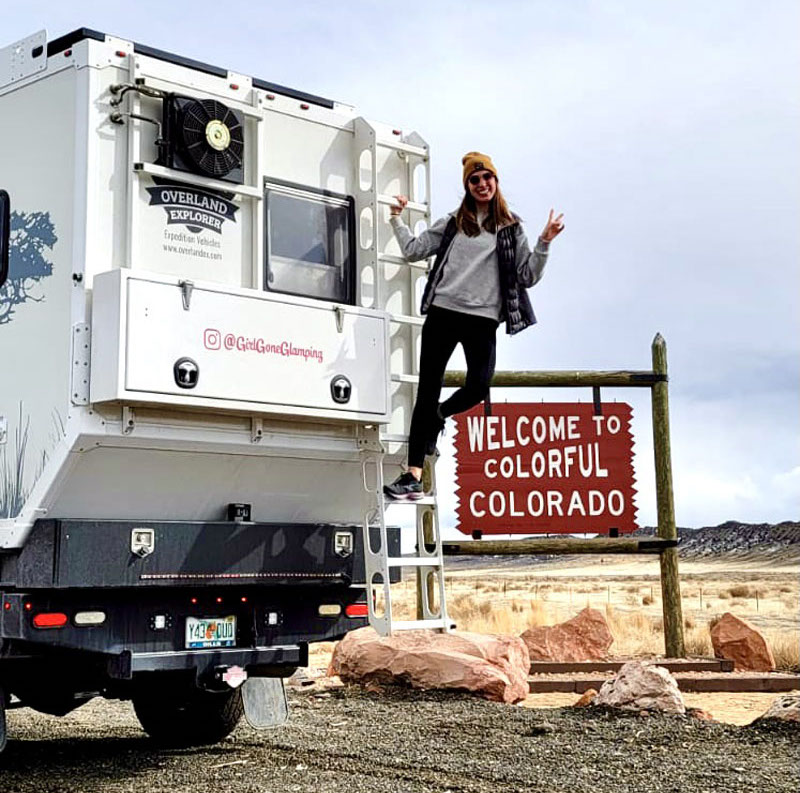
Above: Lindsey Kszos, Girl Gone Glamping, and her OEV truck camper
How did you decide to go solo and full-time on the road?
I grew up in a small farm town outside of Buffalo, New York. My public high school had fifty kids in my graduating class. I wanted a big and full life, but I didn’t know what that looked like. I moved to Manhattan and then Chicago and loved those experiences for that chapter of my life. But, then it wasn’t fulfilling anymore.
I think the older we are, the more we gravitate to our roots. I wanted to live in nature and seek out city life. My first thought was to live and travel abroad. That idea was scary and didn’t seem attainable. What if I could live everywhere in the USA? How could it be sustainable, affordable, and safe?
When I got my first camper, I went big and got a 23-foot Airstream and it was amazing. For the first nine months, I traveled in a big loop around the country.
Through that experience, I realized I could do it. Why can’t I do this long-term? I shifted my mindset around that. I had a steep learning curve and found that I was motivated by those challenges. Nothing deterred me from it and I was focused on the good and positive.
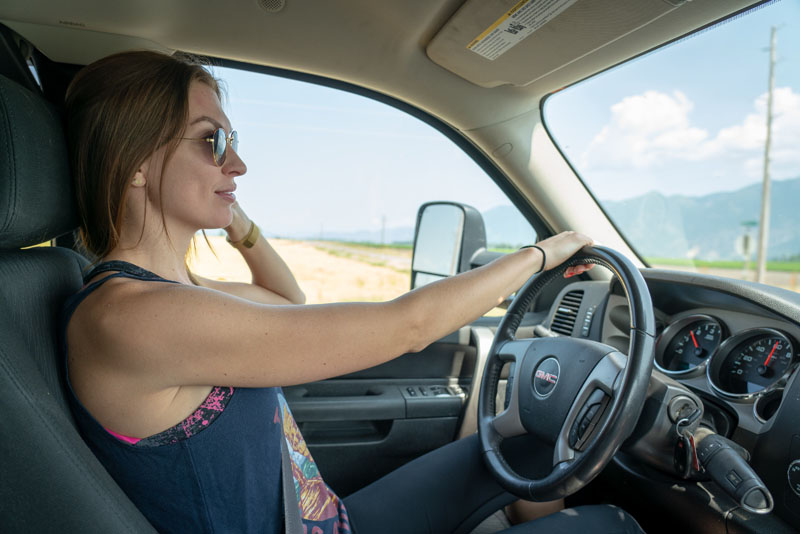
For the first six months, the adrenaline kicked in. Then months six and seven I got lonely because I hadn’t seen a familiar face for a while. So, I focused on myself and self-growth. Besides everyone I’ve met on the road, I’ve also gotten to know myself. It sounds a bit corny, but that’s the advantage of being remote. I found my own purpose.
When I started traveling, Instagram was not big, and I had no aspirations of doing YouTube. I was on Instagram to document and share my travels with fellow solo travelers, but it was not my main goal. Now it’s super humbling to get inspiring messages from other people. There is a little fear because it has become an identity. When I hang it up, do I have to go through a process of, ’who am I?’
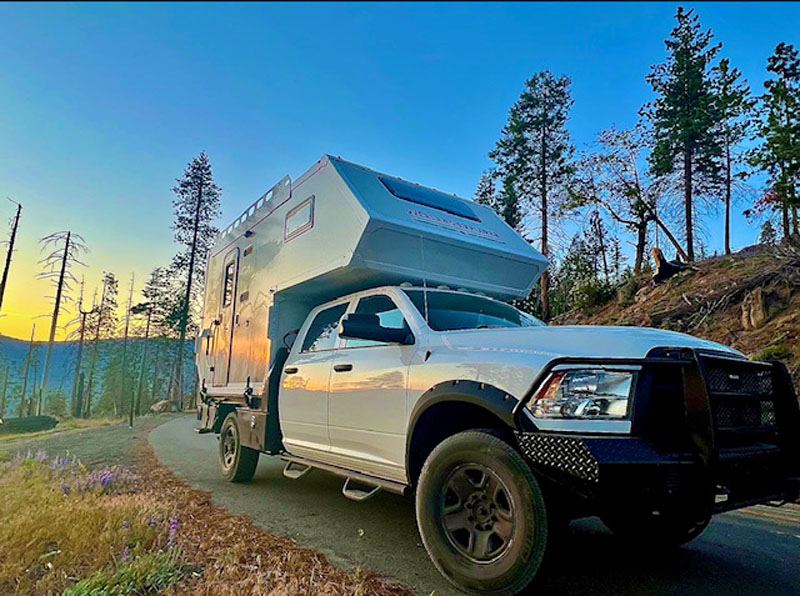
When you went full-time, did you sell your belongings or put things in storage?
Pretty much everything I own is in my rig. Three or four totes are in my parent’s basement, but not much. For the last six months, I have looked into getting a storage unit out west for the gear and toys that I don’t have the capacity to carry with me.
I am living through all seasons in my rig and rotate from summer to winter gear. My back seat has become my extended closet and garage. If I get a storage unit it will give me some space. When I first started, I was good about one thing in and one thing out but, with over six years of being on the road, things have started to pile up.
What is being by yourself on the road like?
I am definitely very social and extroverted. I will go to a bar in a town by myself and meet people. As I have gotten older, I am more introverted and need more alone time to recharge, but I can also be social and chatty. I have worked for myself for twelve years and that has shaped my personality.
When I was in my young twenties, I was into loud music and the busy social scene. And now I’ll sit at a corner table and watch the action and not be in the thick of it, so things have shifted a little bit. I like that with this lifestyle I can dip into the towns and city life, and then drive twenty miles to BLM and be in silence. I have everything with me and I don’t have to make provisions and plans to escape.
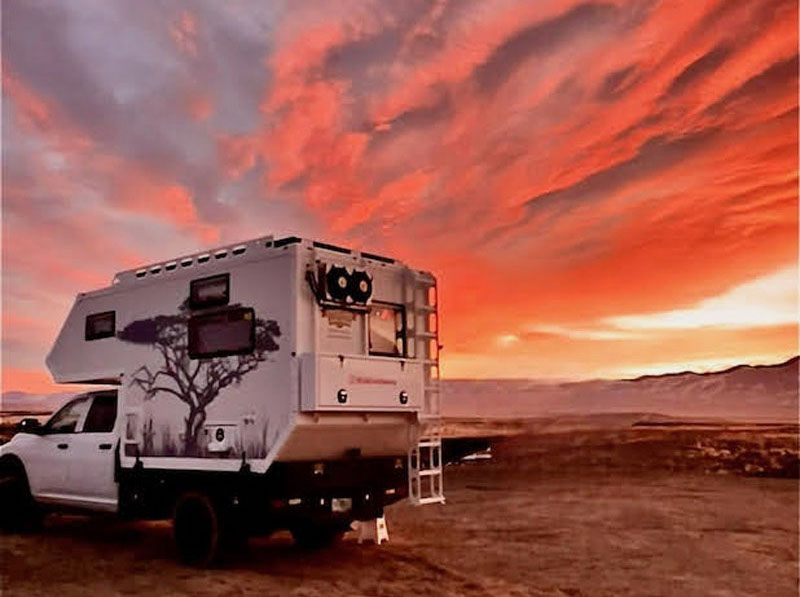
This lifestyle can be a grand adventure or very isolating. At times it’s hard to find the middle ground. It’s made me work on that more. I am just not chasing the next trail hike anymore. I’m trying to find a day-to-day routine just like people who live in a brick-and-mortar house. After six years I have a better handle on it. Thank goodness for Facetime. Since my nomadic network has grown, wherever I am, I am not that far from a friend or a friend of a friend.
I have flown my mom out to visit me at a campground. I do not go too long without seeing my nearest and dearest, so they will fly here or I will fly there. It is important to maintain relationships.
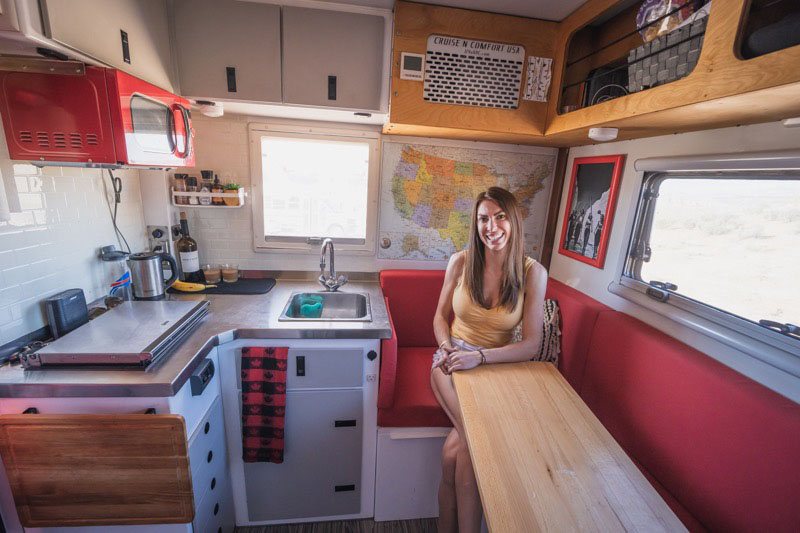
I don’t long for a specific area or dwelling. My camper is such a safe haven. I’ll get snowed in when I am in the mountains and I’m tucked away drinking tea in my camper with my twinkle lights and it makes me so happy. I am probably too attached to my camper, but it’s my home and it has carried me to so many places.
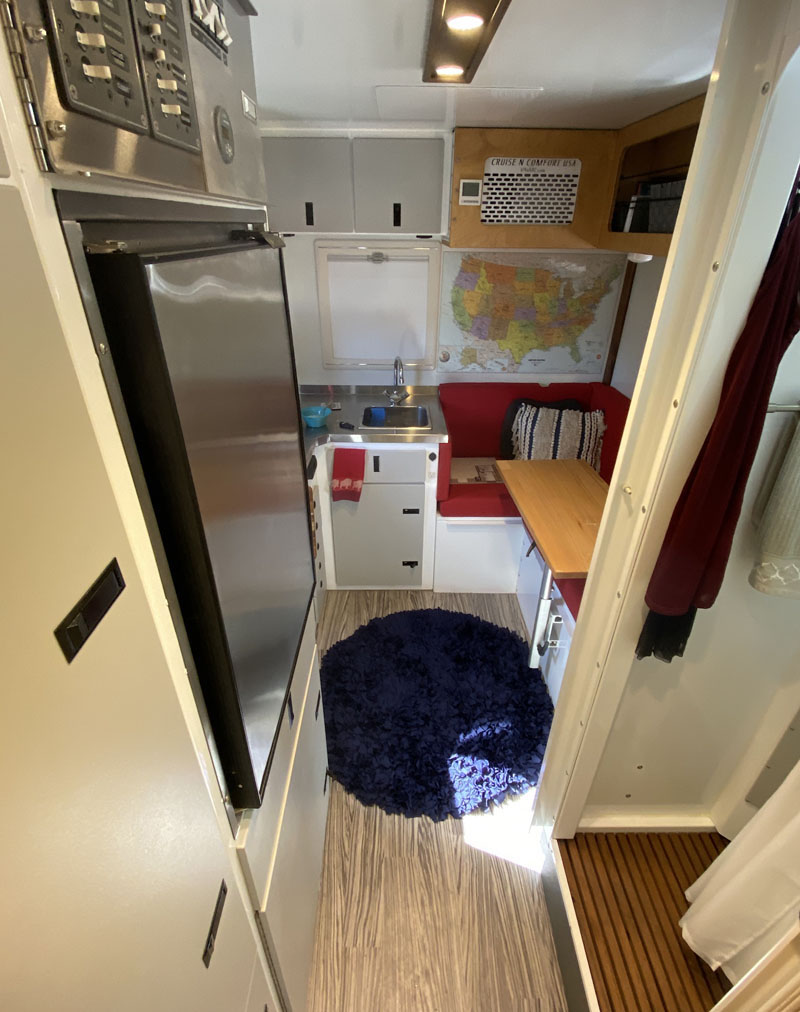
How did Covid impact your lifestyle?
It was a weird scenario. I was in Revelstoke, British Columbia skiing when the lockdowns began in March 2020. Canada stayed open five or six days longer than the United States. I was getting updates about things closing. I was sitting in my camper in an area with more animals than people.
I was thinking, “Oh my, is this real? How is this going to impact me?” My parents were begging me to drive to New York. My mom was like, “What if you get sick?” and I was in Canada. I didn’t know how long it would go on, and I didn’t want to be stuck in a place for months.
I stocked up on food and water and figured I could ride it out up in Canada as long as I could be connected to work. Then I got a text from the Canadian government basically saying, “Now is the time to leave”.
It was the middle of March. I started calling friends and some had closed off their quarantine pods. One friend in Florida had a guest house and invited me over. I drove to southern Florida from British Columbia. The entire way there I was listening to the news. There were truck stops that had closed. I couldn’t find a place to dump my cassette toilet. As I was driving it was like they were closing every state. It was crazy. I made a couple of jokes like, “I’ve been preparing for this for years”. I didn’t mind the alone as long as I could be safe.
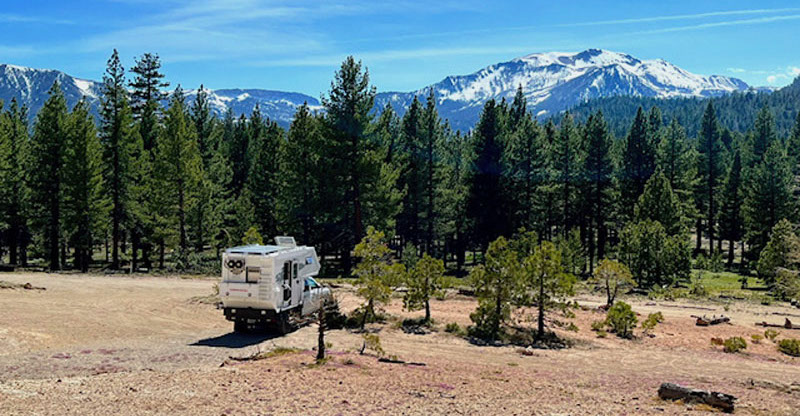
One thing I would be most concerned about traveling alone would be safety. What do you do to feel safe while you’re on the road?
I traveled a fair amount internationally before I went on the road, so I have a skill set of being aware of my surroundings and trusting my gut instinct. I do a lot of research about where I’m going to stay. I stay connected to cell service during my work week.
When I do go into the middle of nowhere I have my long gun, which is legal in all states. I have a case of ammo and my gun is in a case unloaded. There have only been a handful of times that I’ve felt I’ve needed it. Having it allows me to sleep with peace of mind.
I am more concerned when I’m urban camping. When I am in the middle of nowhere, I do not think there is a serial killer hiding behind a rock. One of my favorite things about my current rig is that it’s 46-inches off the ground. When I open the door, my foot is in your face, so someone can’t rush into it.
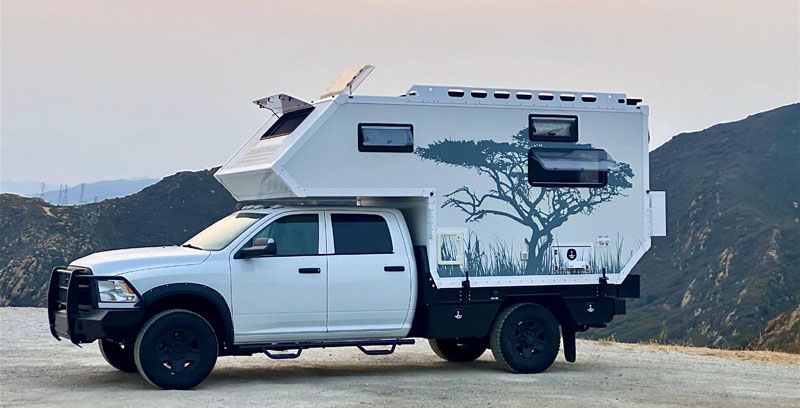
I added windows to my camper on purpose so that I can see all the way around it. I’ve had a lot of good experiences with people offering me places to stay. I don’t know if it’s because I’m a female by myself or because they want to hear my story and support what I’m doing. So many Thanksgivings I have had dinners with friends of friends.
I get check-ins from people I’ve visited throughout the year. I have a Google Map with hundreds of pins saved on it. I will also note on my Google Map, “Don’t go here again” or, “This place seems sketchy”.
But, overall, throughout my experience on the road, my faith in humanity has been restored. People for the most part are good. If a place doesn’t feel safe, l keep driving. During those times, I sometimes wish I had a companion to bounce decisions off of. I haven’t had that consistently, so I have learned to rely on myself.
I have my location shared with my mom and my best friend on my iPhone at all times. If I do not have cell service, I tell them the general area. It’s important if you are by yourself to check in with people. Another thing is I do not let my gas tank go below half a tank.
I always try to think a couple of steps ahead. For example, I do not face my rig toward a cliff. I back up so that I can drive out of any situation.
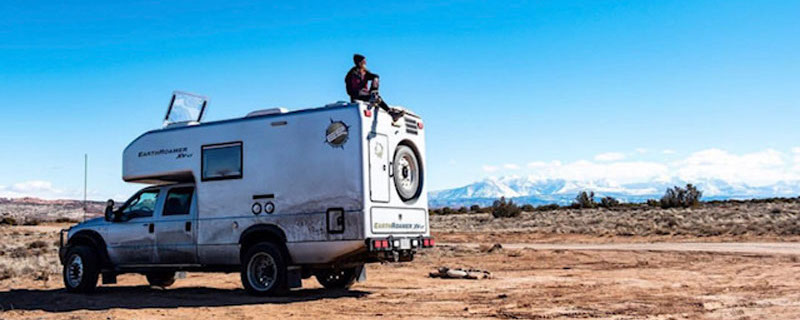
Above: The Earthroamer Lindsey rented
Has there ever been a situation in which you’ve said, “I’ve got to get out of here”?
Before my truck camper, I rented an Earthroamer for a 6,000 mile road trip. I was passing through Portland and found a place to park. At 2am people were pounding on the rig, and talking to themselves. That night I was glad to have the pass-through. I don’t have one with this rig, and can’t because my back seat is full of my gear.
One of the first times out in my Airstream I was on BLM land and traveled on a dirt road for about an hour and hadn’t seen anyone. Then, I saw random people pushing shopping carts down the dirt road. I thought there might be a community in the woods. With my shiny trailer, I was thinking, “Am I a target?” I ended up being fine and I stayed six days there, but my gun was loaded the entire time. In my Airstream, I couldn’t make a quick getaway.
When I lived in New York City I was not going to walk down an alley at night or take the subway at 2am. I take extra precautions whether I’m in the camper or not. Safety is important.
A few times I have not felt like anything was wrong and I have gotten a knock on the door. That was more alarming because no spidey sense went off. Once it was a security person at 10pm telling me the Walmart parking lot was not safe. I said, “Safe or allowed?” I was jarred by it because it didn’t make sense. I didn’t want to be a burden. If I am in a parking lot, I want to be respectful. He told me about a Sam’s Club six miles away.
Then, at midnight I got another knock. I was slapping my face to wake up and said to myself, “Snap out of it”. This time, through my closed door, I had a longer conversation with the new person. He was a security guard and he told me it was dangerous to park there. So, I drove to the next town’s Cracker Barrel. I later found out that there were drugs and prostitution in that area. I was shocked because the area looked okay. So, do your research.
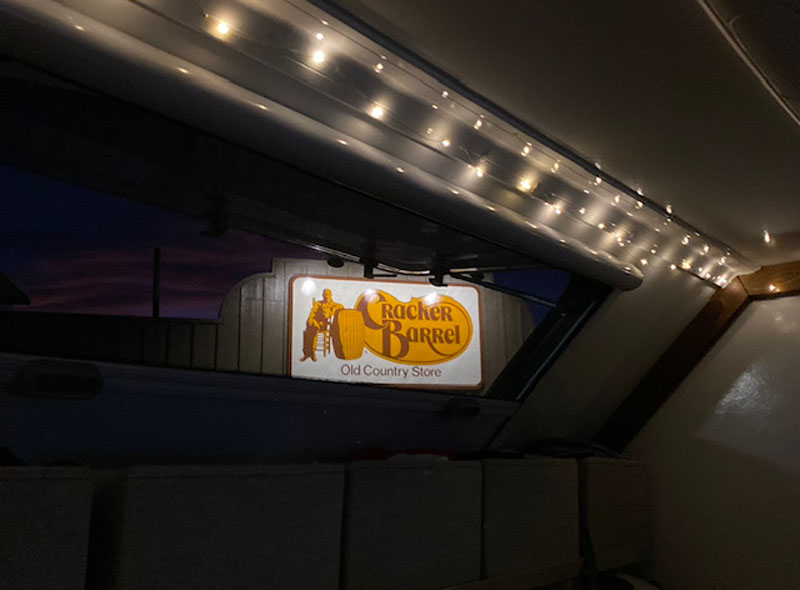
What research do you recommend to determine if a place is safe?
I’m a big user of iOverlander. I deep dive into the comments and reviews. I also look at freecampsites.net and Walmart reviews.
I will also zoom in on a place on Google Maps. Does it look safe? Are there run-down buildings? A lot of times when I am getting gas in a town I will ask the locals. They may tell me a better place to park. I also have to trust my gut.
All of this does result in decision fatigue because I am constantly figuring out where to stay. After six years I do have some favorite places that I know are safe, especially in Wyoming, Utah, and Colorado.
I used to travel quickly staying one or two nights at a place because I thought that I was only staying on the road for a year. Now I go slower. You’d think in the winter I would be going slower because of the elements, but I’m actually chasing snow storms because I like to ski.
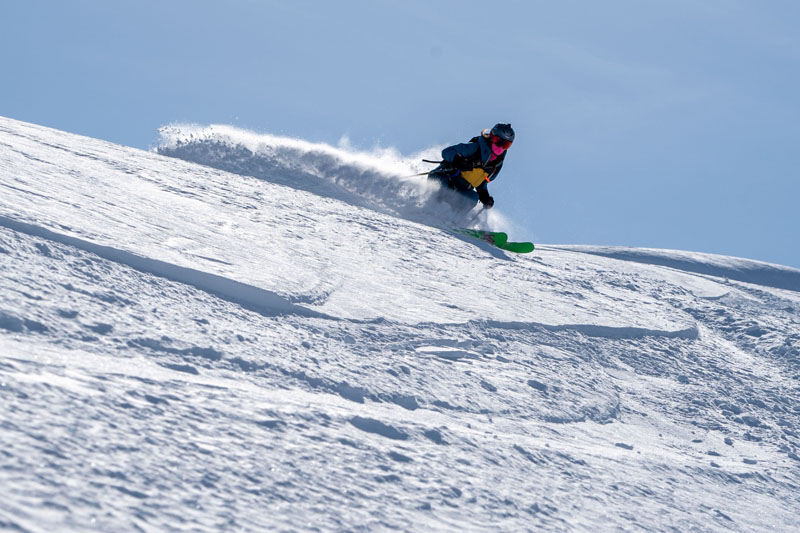
Sometimes I do not know where I am going until I see the forecast. It is harder to boondock in the winter because areas aren’t plowed. The free places to park are where the snow is piled up.
Last winter, I spent a month in Utah and a month in Colorado. It is better to go at a slower pace because I forge better friendships. It’s also better for my gas bill. I seek out places to stay longer.
The decision fatigue has to do with new places because I also have to find new grocery stores, places to get a Fed Ex package, get water, and so on. Being on the road has sharpened a lot of skills and I feel like I can handle myself in a lot of situations, but with that comes exhaustion.
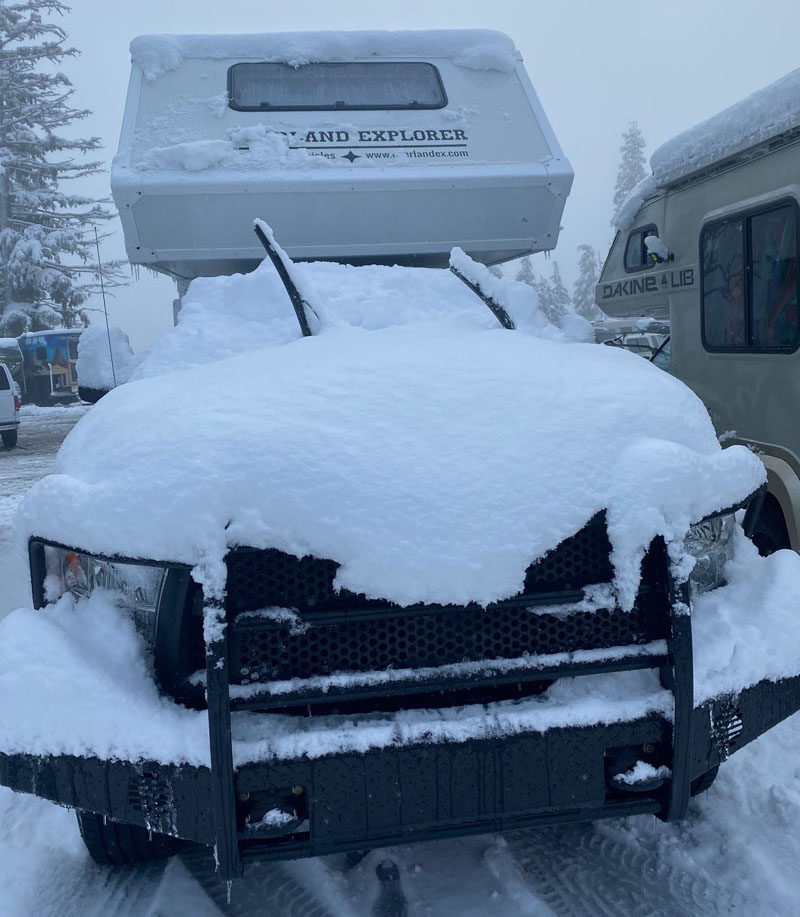
Where do you typically stay?
I don’t mind state parks or BLM. I have stayed in KOAs, but they are freedom with an anchor. You have to make a reservation two weeks out and they may not have availability.
The rig I have now is robust and it can take me further into the backcountry. I seek out places like ski resorts where I can stay in the parking lot. I do a lot of street parking. I like to go into town, but I do not want to upset people.
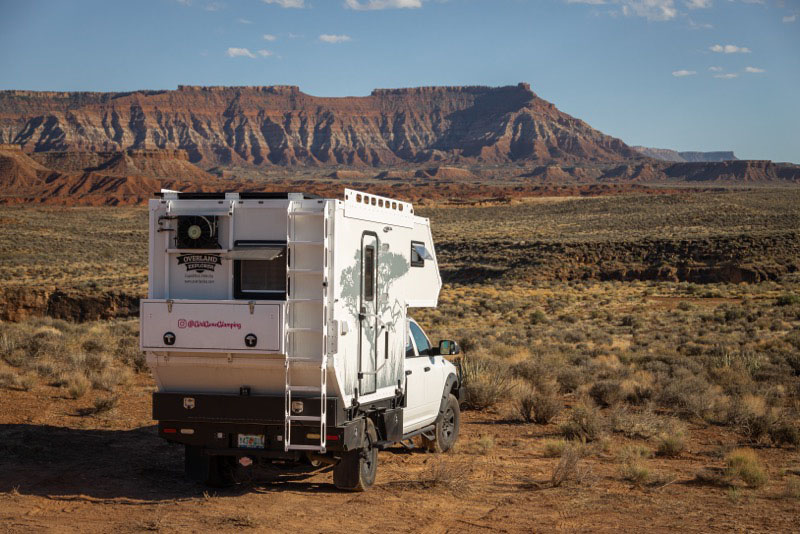
Your rig features your social media handle. Has that brought you attention?
I do have my social media handle on the back of my rig. People have said that’s stupid or it’s okay for a guy but not a girl. I don’t like to operate out of fear. If someone watches me for more than 15 minutes, they know I am by myself.
Once I woke up in Vancouver, Washington and there was a message on Instagram. Someone saw my rig and invited me over to do laundry and brought me out some baked goods. That was pure kindness. So, good things come out of it, too.
From my perspective, the social media handle adds a level of accountability. I am a safe driver. If I camp somewhere, I am not going to leave trash. To me, it’s a good way of marketing. It has brought me opportunities. I had a tour of my rig go viral on someone else’s YouTube channel and it’s had six million views. That’s the population of a medium country.
I have one sister and she is an introverted saint. I could see her not wanting this because she doesn’t like conflict. Because of my personality and my faith in myself, the more positive experiences have solidified my decision. A crazy stalker may make me feel differently.
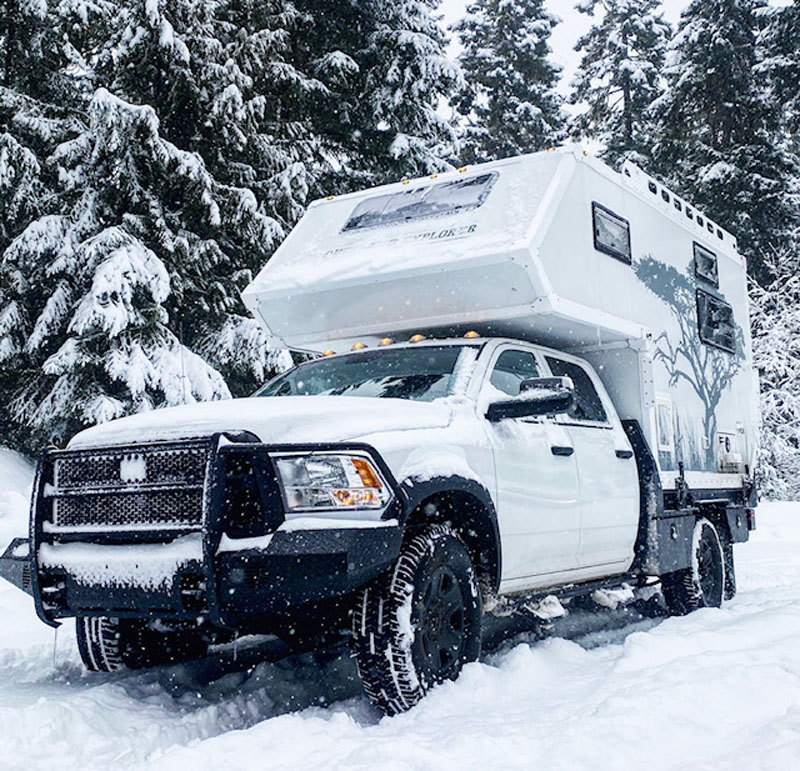
Why did you want a truck and camper rather than a van or motorhome?
If money was not an option, the Earthroamer would have been in my top choice, but I don’t have that kind of money. I Googled, “poor man’s Earthroamer”, and my Overland Explorer Vehicles (OEV) camper popped up. I am 5’10” and I camp in the winter and the cold, so I wanted a hard shell.
I saw these flatbed campers and the extra storage made sense. My camper is also removable which is good for resale. If my transmission dies, I can put my camper on another truck. OEV’s build quality is top-notch. Everything is beefy and strong. It’s a total fiberglass composite, so it’s not going to rot. On the actual structure, nothing is going to get damaged.
It was a lot of money and basically took my life savings. I also bought it sight unseen, but I have zero buyer’s remorse. It was very kismet.
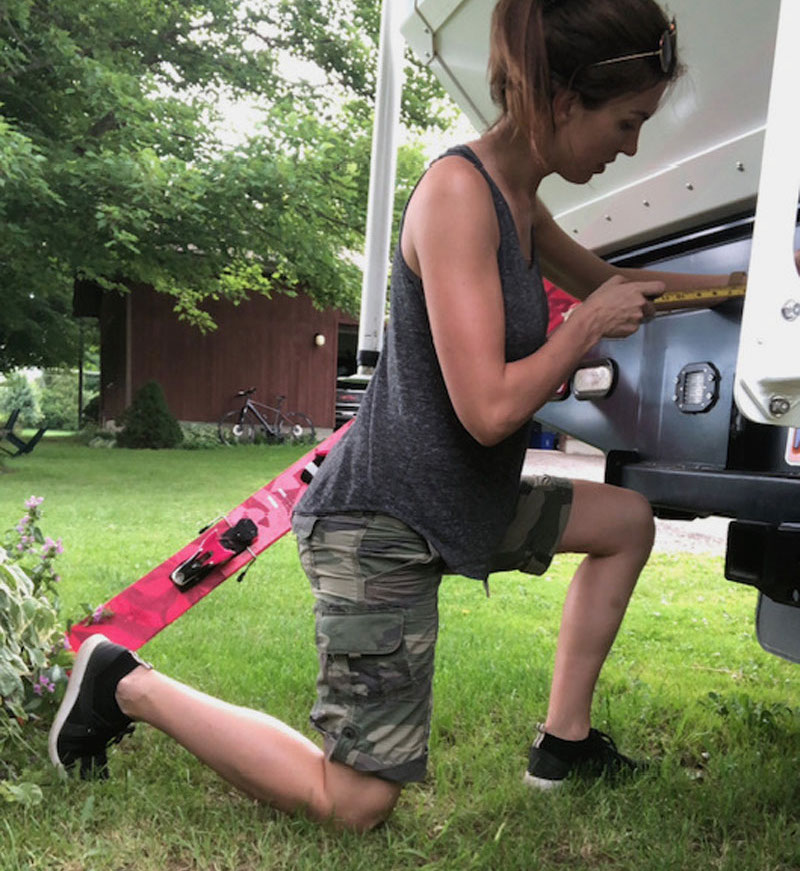
My dad is a welder and he has helped me come up with more storage options. I have a ski box on the back and steps to get in. The camper is now more my own. I’ve been in this rig for three-and-a-half years and there’s not much I would change. I feel like I don’t have to worry about my rig while I’m on the road. I am very fortunate that I had this rig before Covid; before the prices went up. I have also added solar and lithium.
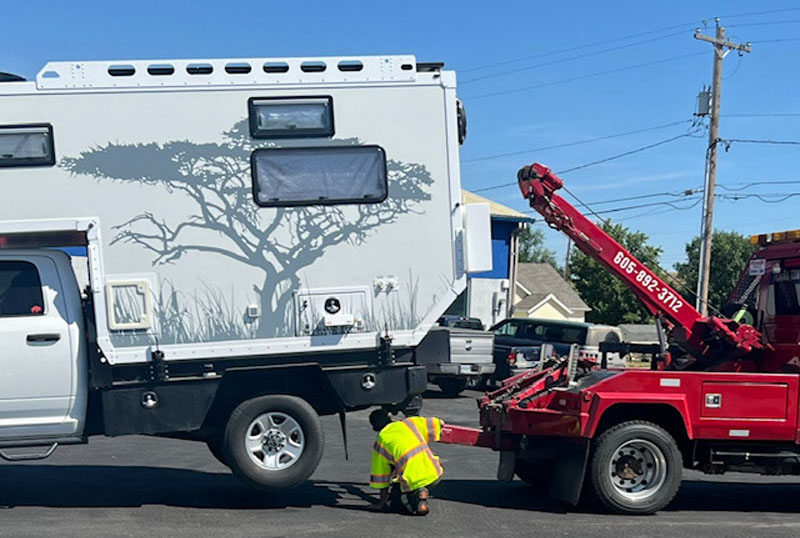
We always say that being on the road full-time brought us the high-highs and the low-lows. What are some of your high-highs and low-lows?
Definitely, a low-low happened this past summer. I needed a simple hub assembly that was $300 for my truck. They neglected to oil the rear axle, and 50-60 miles later it chewed up my gears and there was a hole in the rear axle.
I was in Sturgis, South Dakota. It was 100 degrees. I was rationing toilet space and water. Then there was crying because I knew as soon as the problem happened what went wrong. It was $18,000 and I was out of my rig for two months.
There were also so many days of people not taking me seriously. My first call was to my dad who explained to me exactly what happened. Then, Ram was looking over it. I had to get a lawyer who couldn’t look me in the eye. If I was a male, would they have taken my word? I felt disrespected. Even thinking about it makes me emotional.
I knew it was going to be a dump-your-life upside-down event. All of this was happening while I was running a business full-time. Even getting the tow was expensive because of the size of my rig. I had shops telling me I’m too big or small so I couldn’t find anyone to work on my truck. That was really hard. I was wondering if it was going to be a make-or-break about being on the road.
In the end, it all worked out. My truck got a brand new rear end; drum to drum.
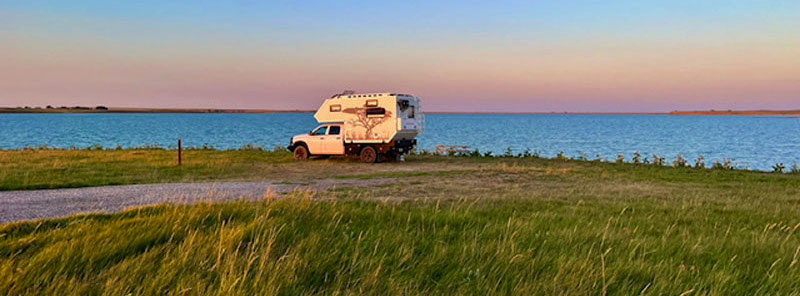
As far as highs, I have been able to explore so many new places. I like the newness of a place. Seeking out new places is so special. As I get older, experiences where I feel that way are fewer, but that newness is why people get addicted to travel.
Seeing a mountain range and having a powder day for me is as exciting at 38 as it was at 18. Over the past six years, I’ve learned to ride motorcycles which is thrilling and I love that there is a community on the road. The amount of sunrises and sunsets I’ve been able to see has been a high. I feel like I have more tucked away in memory than people get in a lifetime. I hope I never take it for granted.
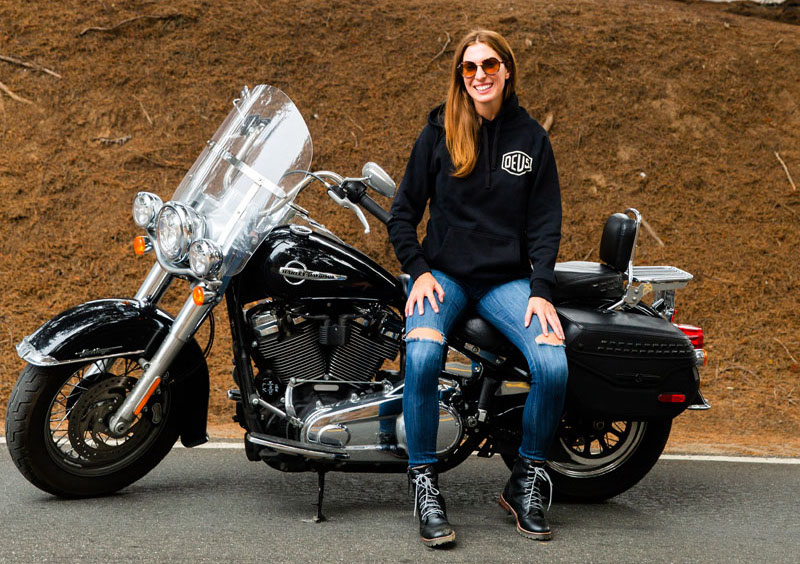
I feel like people live a stationary life in a funk. A change of scenery does people good. I have change every day, so my life changes constantly, and I have control.
Other than work, what do you do day-to-day?
I am a creature of routine and habit, which is kind of funny. Maybe that’s why I’ve been happy on the road. Every four or five days I dump the cassette. Every three weeks I get fresh water. I have good organizational skills to handle a full schedule. I make lists and I feel better when my chores are done for the day. I am able to work from the road.
There is a lot of upkeep when you are in a new town bouncing around to get mail or water or groceries. You have to plan or you are burning time and fuel.
I like to keep a 6am to 2pm work schedule. I am in bed early on the weekdays, and on the weekends I am doing something I really love. I am off-grid or I ski. Besides space, I am not sacrificing all that much for everything I am getting out of this experience.
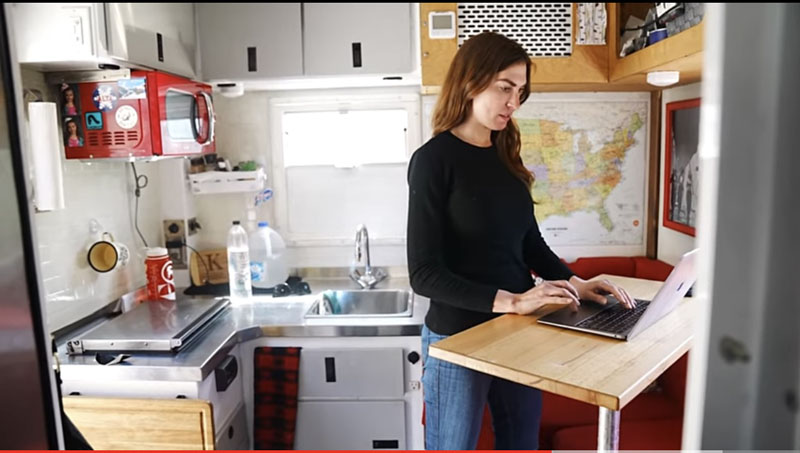
How do you make a living on the road?
I am fortunate to be able to run a logistics brokerage company while I’m on the road. I put a standing desk in my camper because I don’t like working from coffee shops.
In the early days, I was mostly on the East Coast, so my camper was great for traveling, visiting clients, and meeting new clients. I don’t want clients on the West Coast because then I’d be working in different time zones.
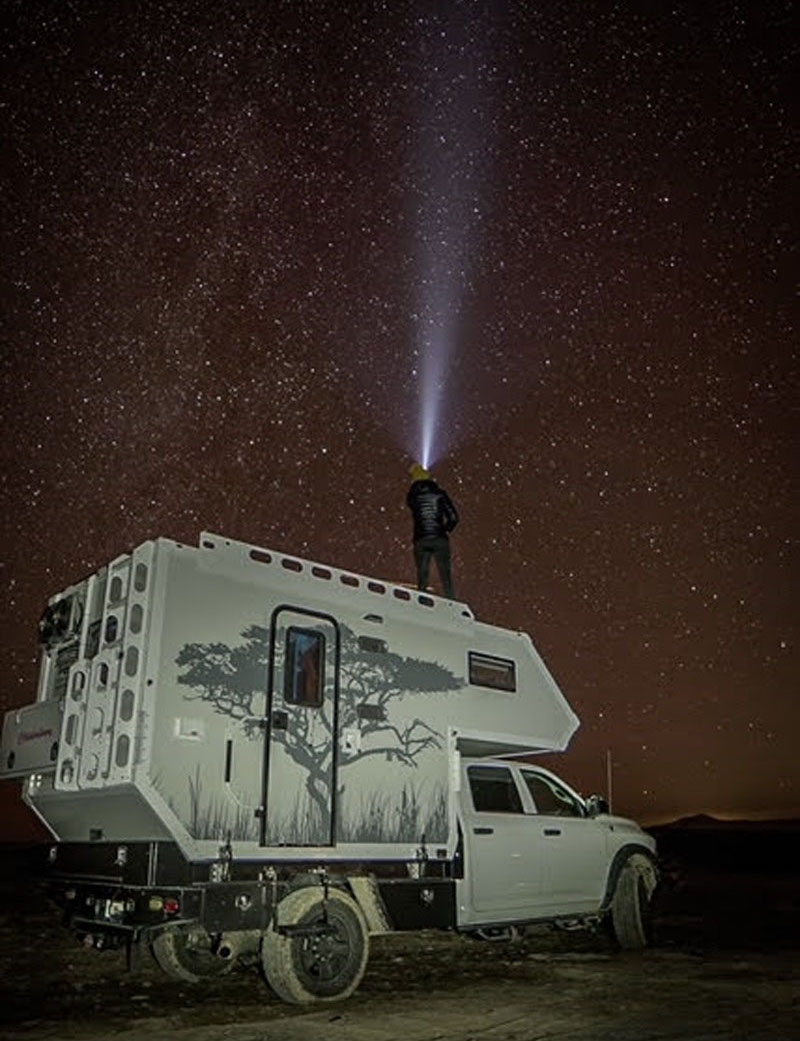
What advice do you have for women who want to be solo on the road?
Investing in yourself is a good idea. For example, have someone teach you how to change your truck tires. You are your biggest asset. If you have some mechanical knowledge, you are more at ease. I grew up on a farm and my father is an engineer and welder. Problem-solving on my own has gotten me further.
If this lifestyle is something you’re considering, make a list of reasons to do it and not to do it. Spend some time on that. You can try it for six months and if you don’t like it, you can stop. Most likely it will have had some impact on you and you will learn about yourself. I don’t know anyone who has tried it and regretted the experience.
There is also so much information on the internet. If you have questions, feel free to send me a message on Instagram at Girl Gone Glamping. Also, tap into the network of RVers out there. There are lots of apps and meetups. You can easily find community on the road. How it changes you is going to be unique to each individual. Before this, I never thought about riding motorcycles. It’s opened my eyes to different adventures.
For people thinking of getting a rig, it doesn’t need to be perfect to get on the road. You can get out there with less than you think.
